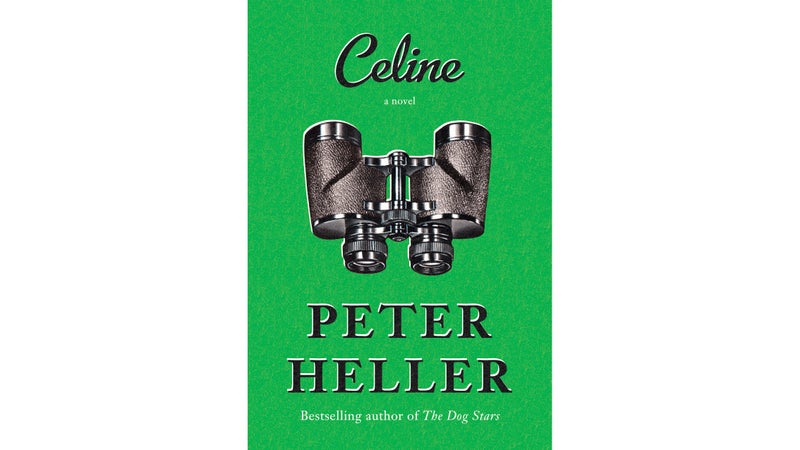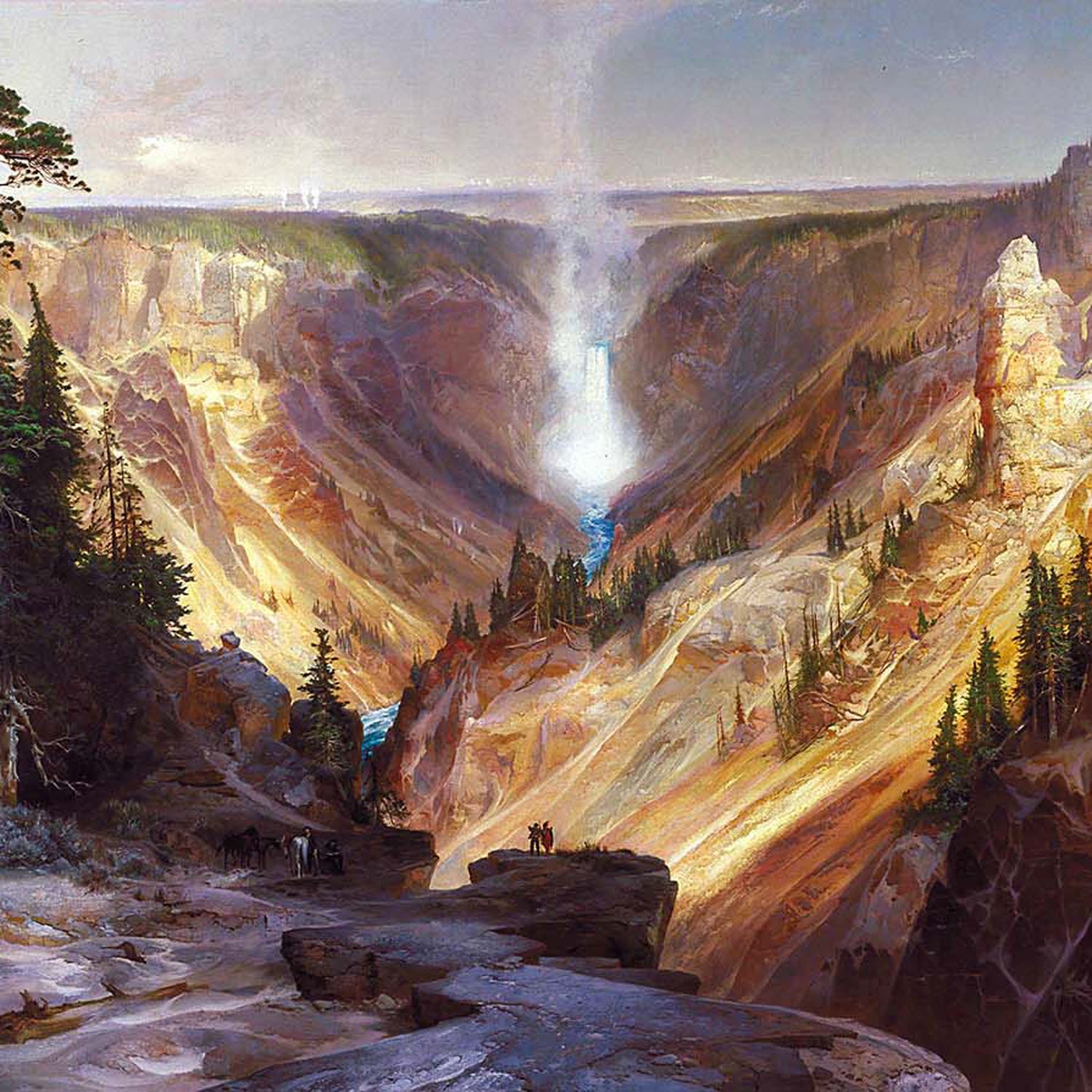Yellowstone has been luring artists since before it was even a park. In the 1870s, when Congress was debating whether to establish it as our first national park, a painter named Thomas Moran did a lot to rev public opinion. His sketches gave many Americans their first glimpse of the park, and his —an astonishing oil painting that measures 7-by-12 feet—captured its color and scale. “If ever a subject justified the use of a gigantic canvas,” wrote one critic, “surely this one does.”
And yet, when it comes to depicting Yellowstone, there’s something to be said for the humble hardcover. Consider Peter Heller’s terrific new novel, Celine ($26; ). In it Heller shows that he’s a better noticer and describer than the rest of us, and it’s a pleasure to see the park through his prose. But Heller’s novel offers more than mere descriptions. He carefully layers people and settings, emotions and environments; he shows how, in our brains and in our hearts, they so often collide. Celine takes a place we know and uses it to illuminate a character we don’t—and in doing so reminds us that there are some things only a Yellowstone novel can do.

Heller might be the only living author whose biography includes stints as a daring expedition kayaker and a student at the Iowa Writers’ Workshop. He’s written several award-winning books of outdoorsy nonfiction. (Heller is also a contributing editor at �����ԹϺ���.) More recently he’s published two novels, and , both set in the Western U.S.
Celine is his third, and it’s a detective novel. It opens on a Big Sur beach in the 1970s, and you can immediately see Heller’s relish for relating nature: “It was bright and windy, with the poppies flushing orange down the slopes of the bluffs, all mixed with swaths of blue lupine. The Pacific was almost black and it creamed against the base of the cliffs.”
Heller’s scenes always hum like this. He captures scenery with spry verbs (a lake’s water wrinkles; fallen trees silver in the sun). He activates a reader’s senses of smell and sound (an unseen elk calls to her calves). His portrayals, whether of the California coast or the Wyoming wilderness, feel less like a static canvas than a living, breathing event.
On the beach that day occurs one of the two tragedies that will drive Celine. A young girl named Gabriela arrives with her parents, only to watch her mother die, swept out in a surprisingly violent tide. A few years later, Gabriela’s brokenhearted father also disappears. He’s a talented photographer, doing a shoot of Yellowstone’s grizzlies. Local authorities find his empty car a half mile outside the park, surrounded by bear tracks and a big smear of blood.
Heller probably chose Yellowstone as the setting because it adds one more contradiction to Celine—a contrast to her aristocratic big-city milieu. (He also probably chose it because it’s a setting he clearly loves.)
Two decades later, Gabriela shares her story with Celine, a New York detective and the novel’s heroine. Celine is tough, tired, and very funny—exactly the sort of person you want to spend 300 pages with, or who you want to solve your Arctic-level cold case. (“She had no patience for a bad liar,” Heller writes. “A good liar, on the other hand, was someone to learn from.”) Celine agrees to revisit the death of Gabriela’s father, which means traveling to Yellowstone and uncovering some dark secrets along the way. It’s a pulpy, twisty plot, but Heller keeps it fun without letting it turn cliché. This may be hardboiled fiction, but it’s made with a free-range egg and served with a side of Jacques Pépin’s mustard sauce.
A lot of this elegance flows from Celine herself. Start with the unexpected fact that she’s nearly 70, an old-money sophisticate who, when she first became a private eye, used opera glasses on stakeouts. And yet, throughout her career, Celine has preferred to work pro bono, assisting the world’s underdogs. She brims with contradiction. She loves teriyaki beef jerky and marzipan cheese. She quotes Wallace Stevens from memory. As a disguise, she favors orange vests and floppy-eared hats since hunters can go most places without raising suspicion. (“Furthermore, hunters are well armed,” she says. “Always a plus, I’ve found.”) With this many eccentricities, Celine might seem in danger of slipping from quirky to cloying, and in the novel’s one weak stretch she nearly does—after a crackling start, the second quarter bogs down with too many flashbacks and too much backstory.
But the novel’s back half fully recovers. Heller stuffs it with tingling mysteries and thrilling solutions, like Celine’s clever plan to discover a tail’s identity. (It involves diner pancakes.) He makes room for lively supporting characters—a Latvian waitress, a weathered sheriff—and imbues each with humanity and humor. He keeps everything moving thanks to an increasingly tense plot: there are stolen documents, tapped phones, a greedy stepmother, and rumors that Gabriela’s father once worked for the FBI or the CIA.
Still, the best thing about Celine is that it’s a terrific piece of fiction. And the best way to trace this is by considering the power of its Yellowstone setting. Heller probably chose this setting because it adds one more contradiction to Celine—a contrast to her aristocratic big-city milieu. (He also probably chose it because it’s a setting he clearly loves.) Because it’s a novel, though, Celine can offer more than just lavish descriptions or the comedy of an elderly woman exploring mountainous terrain. It doesn’t simply present Yellowstone, the way a painting by Thomas Moran does. It gives us Yellowstone as seen by Celine, and that combination (complicated place,��complicated heroine) form a revealing and reinforcing literary whole.
At one point, Gabriela reminisces about her father: “I think he tried to live every day just so he wouldn’t die.” That outlook applies to lot of characters in Celine, none more than Celine herself. She’s experienced her own tragedies over her long and strange life. But Heller suggests that one way to confront this kind of sadness is to do what makes you feel useful, what you’re good at. For Celine, that means being observant, whether of potential suspects or gorgeous landscapes. There are several moments in the park where she slows down and notices, like this one by a lake near Jackson Hole: “Dusk was moving over the water with a stillness that turned half the world to glass,” she thinks. “The wall of mountains had gone to shadow as had the reflections at their feet. In the stillness the rings of rising trout appeared like raindrops.”
This is Celine taking her time, soaking in the scenery, savoring the smell of a far-off campfire—not dissolving her grief, but diminishing it. And reading it, you’ll feel like you understand something true about a person and a place and everything that exists in between.


